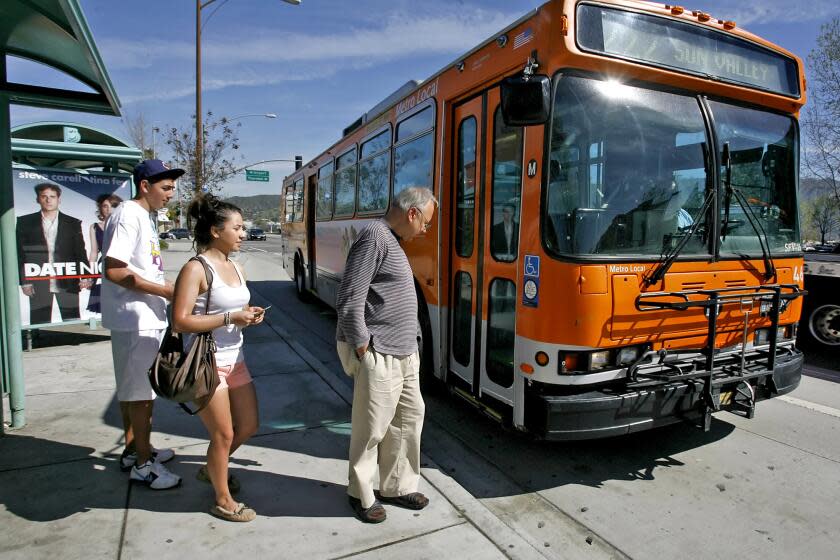At least 40 Metro bus routes faced delays as drivers angered by violence stage a sick-out

Dozens of Metro bus routes were delayed Friday after hundreds of drivers held a sick-out in protest of the rising number of assaults on operators.
The Los Angeles County Metropolitan Transportation Authority said as of midday Friday that about 360 operators had called out sick — about 10% of drivers — forcing the agency to redeploy instructors, field supervisors and those watching from control rooms to the driver's seat.
Unionized train and bus operators have criticized Metro for failing to respond forcefully enough to violence on the system. Drivers have been the target of several recent attacks, including one in Willowbrook where a man stabbed a bus driver while passengers watched.
Last year, the agency logged 168 assaults, a slight increase from the previous year. The assaults included being spat on and stabbed.
"We understand the sick-out affected a small percentage of bus riders," John Ellis, who represents six union locals, said in a statement. The representative of 5,000 Metro bus and train operators for the International Assn. of Sheet Metal, Air, Rail and Transportation Workers told passengers that the union recognizes their "anguish" and that "Metro sees your frustration," adding: "We will continue these stepping stones of safety."
Read more: Metro declares emergency over attacks on bus operators
Ellis has been working with Metro's Chief Executive Stephanie Wiggins to install protective barriers and has been advocating for the agency to create its own police force. He says he believes that working "hand in hand" with Metro leadership will improve security.
Others aren't so sure. The action was not organized by the union, but it raises questions about deep, brewing frustration within its ranks. Drivers have expressed outrage on social media about attacks, and many worry privately about their safety day in and out.
In February, there was an attack nearly every other day — 12 in all — according to a Metro report. In one instance, a driver was punched after asking a passenger at Western Avenue and Jefferson Boulevard to stand behind a yellow safety line.
A longtime bus driver who wasn't authorized to speak to the media said Metro just wants the buses moving, while drivers are worried about not making it home.
The driver said workers are concerned the new protective barriers are not bulletproof.
"Metro doesn't care about its drivers," the person said. "We are all expendable."
Metro warned on Friday of at least 40 bus routes affected by the staff shortage, including Line 53, which runs from downtown Los Angeles to Dominguez Hills; Line 251, from Eagle Rock to Lynwood; Line 115, from Playa del Rey to Norwalk; Line 246, from Willowbrook to San Pedro; and Line 720, from Santa Monica to downtown Los Angeles.
In private Facebook groups, several employees commented Friday that there were fewer workers than usual.
One Metro official said that some drivers offered to come in on their days off. And the agency pleaded with drivers to go to work for the thousands of riders who rely on them daily.
Read more: Metro board ponders facial recognition, other security measures after subway killing
"Transit riders throughout Los Angeles County depend on the Metro bus and rail network every day to reach critical destinations including work, school, and medical facilities, and to care for their friends and family members," agency spokesperson Dave Sotero said in an emailed statement. "We appeal to our operators to reconsider the impact their plan to call in sick will have on some of the most vulnerable people in the county."
Sotero said the agency had taken several steps to increase security, including adding more security personnel on buses to deter assaults and creating barriers to protect drivers. Those barriers were approved last month and are set to be installed in buses over the coming year.
The agency is also "working on longer term plans, which include the addition of even more dedicated transit security bus riding teams," he said.
“Bus operators are the face of Metro to more than 80% of Metro riders," Sotero said. "We understand their and their families’ fear in the face of the senseless assaults some have experienced primarily resulting from the twin crises of untreated mental illness and drug addiction. We share their frustration."
Read more: 'Help me, help me': Metro bus driver stabbed, reviving fears about safety
Metro’s executive board has been grappling with issues of policing on its system for years. Whereas social justice activists are calling for the board to decrease the number of armed officers, employees are worried there isn't enough security. The cost of contracting with law enforcement has been ballooning, and Metro has been considering whether to create its own police force.
Last month, after the bus driver was stabbed and another bus was hijacked, the board asked its staff to look into the possibility of securing gates at train stations and using facial recognition technology.
One driver who did go to work Friday said he hadn't heard anything about the sick-out, although he did notice there were a few people out.
When asked whether he was worried about his security, he replied: "We all are."
Times staff writer Colleen Shalby contributed to this report.
This story originally appeared in Los Angeles Times.


